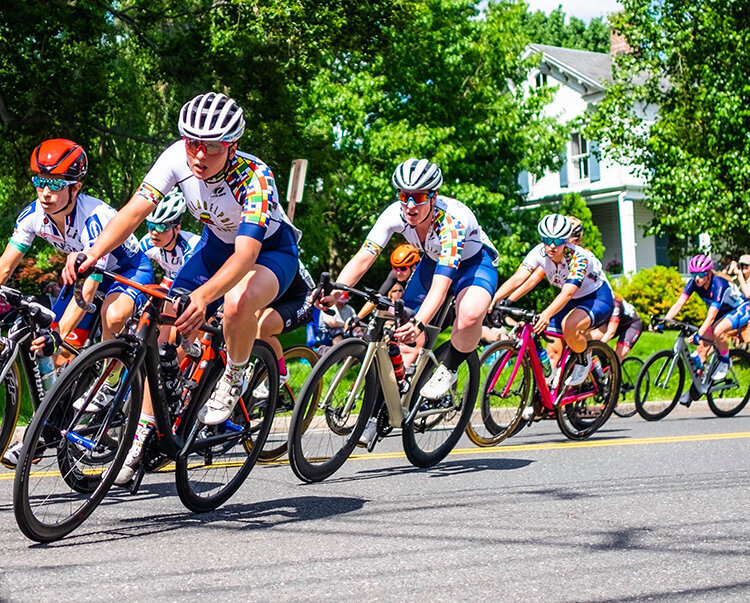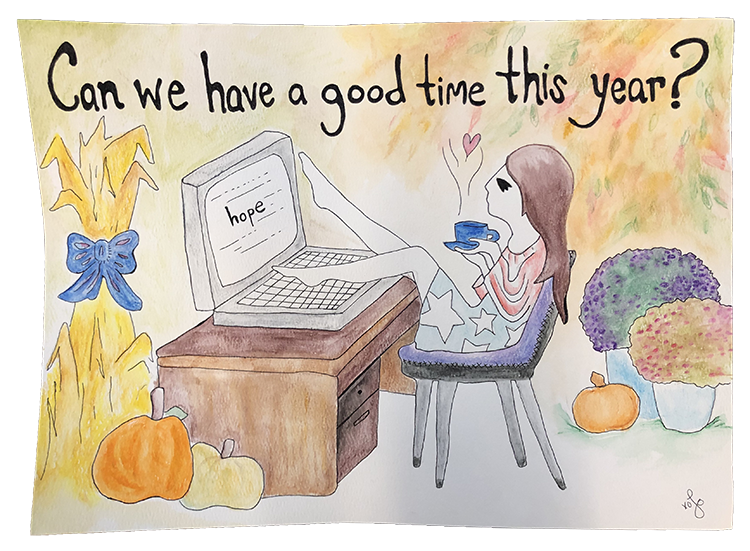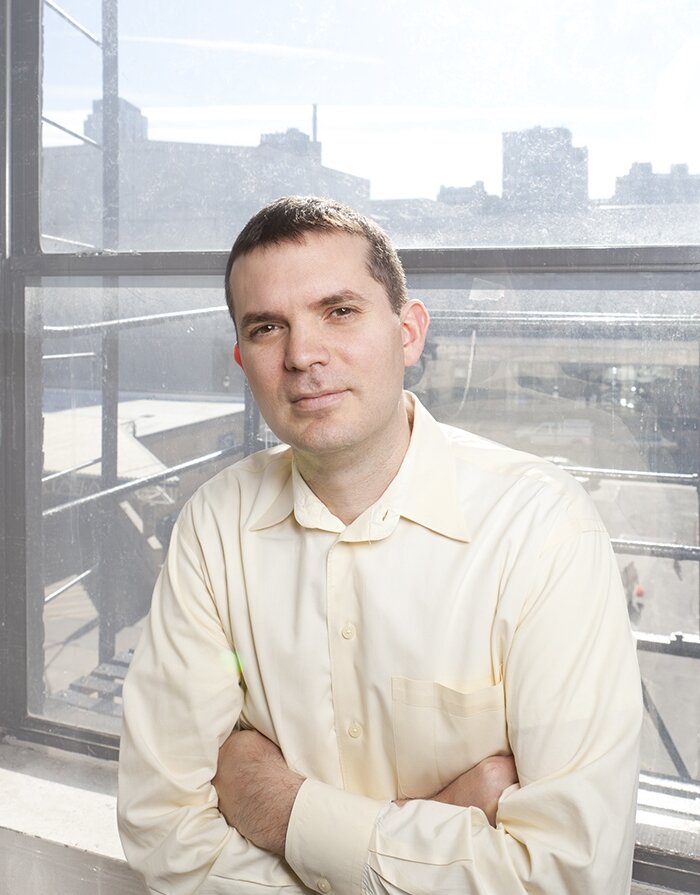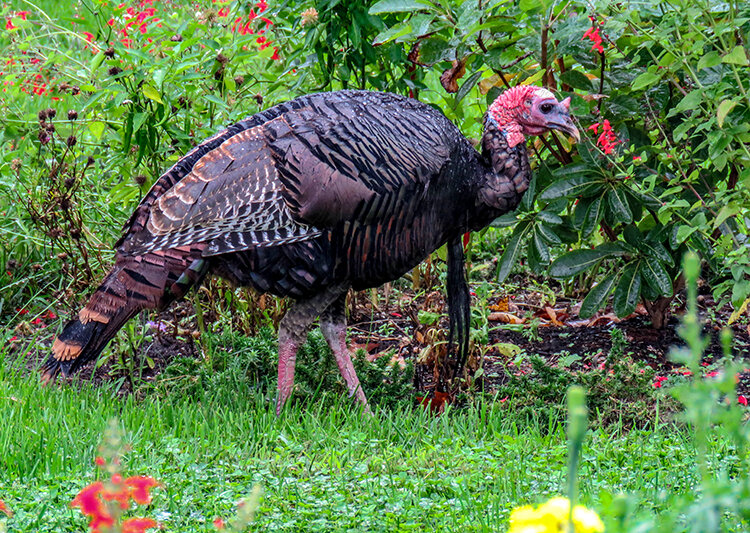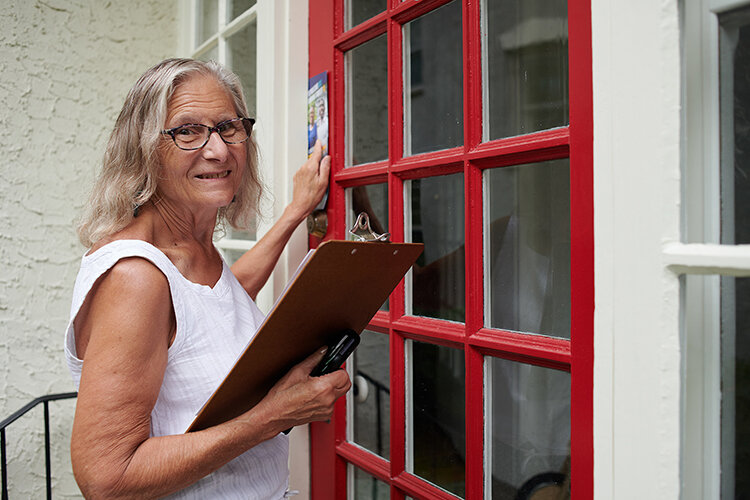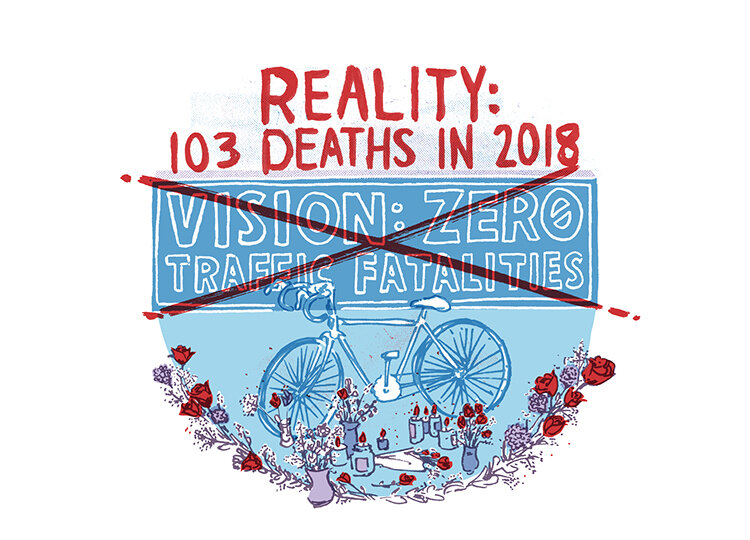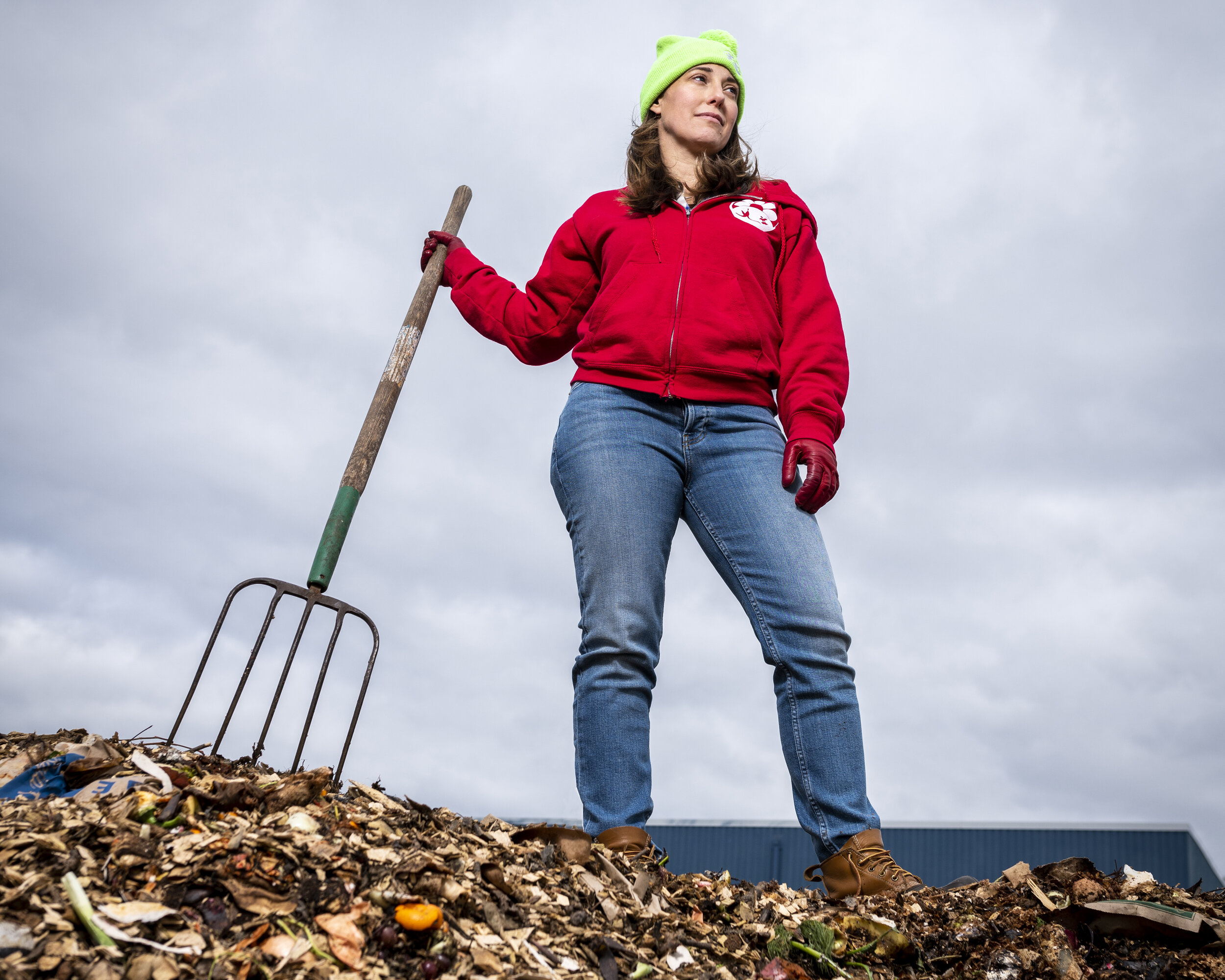
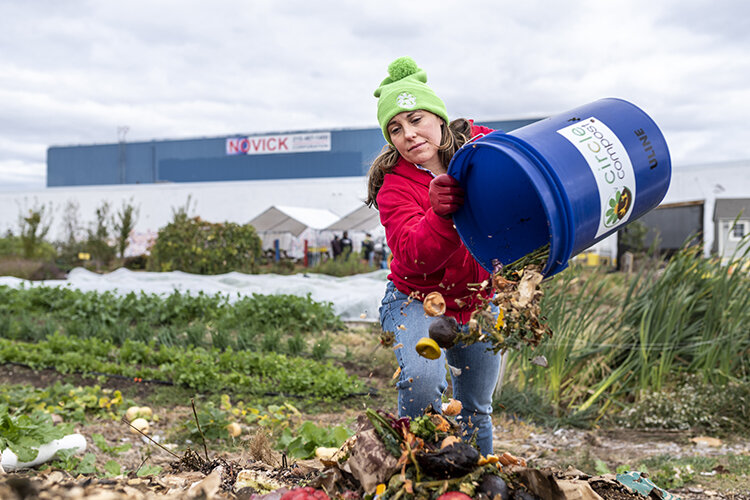
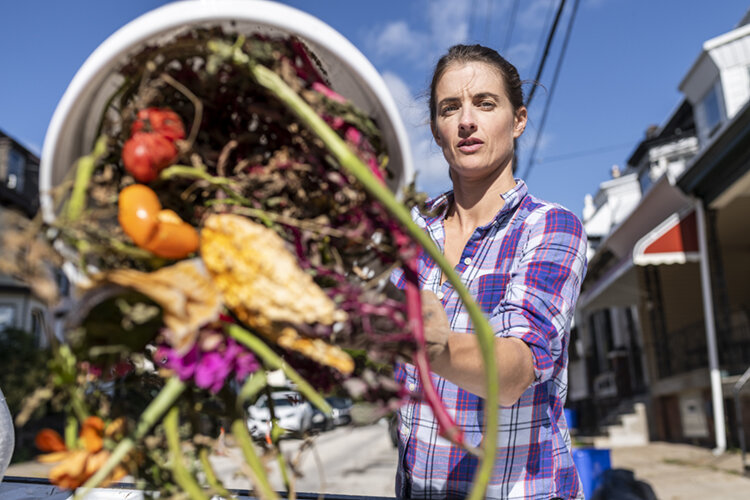
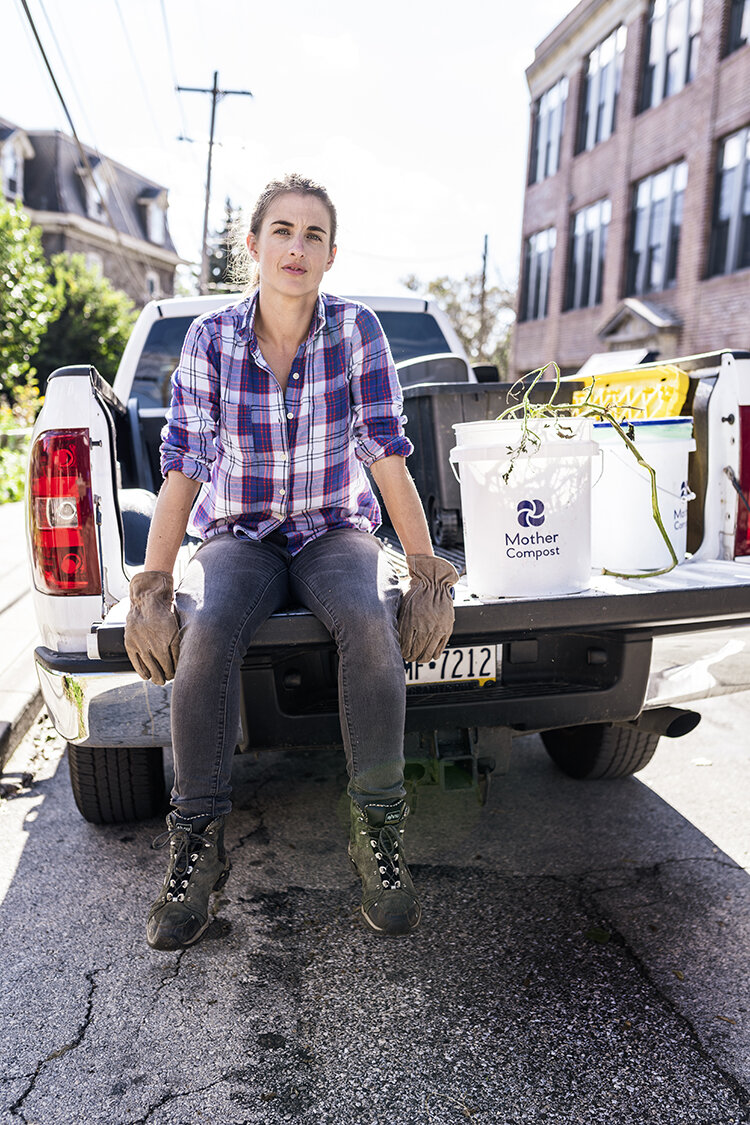
story by Claire Marie Porter, photography by Linette and Kyle Kielinski
Beware, composting is a kind of gateway drug, says Michele Bloovman, co-founder of Circle Compost.
Once you start, it changes your mindset, she says: “You’re gonna be thinking about everything you throw away. You’re going to be changing your purchase habits.”
Bloovman, a food scientist by trade, is one of several female entrepreneurs in the Philadelphia area who have left the corporate world to make a difference in how our waste is managed, taking the matter into their own hands, and buckets.
While we live in a society that’s growing increasingly aware of where our food comes from and how it’s prepared, many still don’t put much thought into where food waste goes.
For instance, imagine you pick the two best locally grown pesticide-free zucchini at your local farmer’s market, a perfectly formed eggplant, yellow squash, bell peppers and onions. You’re making ratatouille, so you carefully and thinly slice each vegetable, layering them in bright and charming spirals atop fresh tomatoes, seasoning the dish with herbs de Provence. Then, you sweep the remains into the garbage can, like most Americans. The scraps are dumped in your local landfill, where they join the 167 million tons of garbage created each year.
And there it sits, unable to decompose properly for lack of oxygen, leaking methane gas into the atmosphere.
When Bloovman and her husband, Dave, a sales and marketing director for a textile firm, began thinking about starting a compost company, they were overwhelmingly instructed to “market to the women,” suggesting that composting appeals more to them, or that women feel more responsibility in the home for their waste production.
As progressive as we think we are, the majority of women are still managing the households, says Bloovman.
She started Circle Compost in 2016 and she says the majority of her 700 customers are indeed women, though more men have signed up recently.
She points out that at the other end of composting businesses, the majority of higher-ups and management in urban farming and urban agriculture are also women.
“They’re running the show,” says Bloovman.
Bloovman was first exposed to waste management and bio-composting while working for a manufacturing company. She loved her job as a food scientist but was constantly aware of the declining state of the environment and how imperfect a role waste management played in that condition.
Landfills aren’t designed to break down garbage; they’re meant to be holding containers for it. The tightly packed, sealed environment of a landfill allows little room for oxygen, so the organic materials that would normally decompose quickly can’t biodegrade. Instead, they slowly break down anaerobically over time, releasing carbon dioxide and methane, a greenhouse gas 30 times more potent than carbon.
Composting is the decomposition of organic materials, such as food scraps, grass cuttings, leaves and animal manures, by aerobic bacteria, fungi and other organisms. The matter is eaten by microorganisms that turn the raw material into compost, a rich soil conditioner that smells earthy and suppresses plant diseases and pests.
When a compostable material is put in a trash bag and dumped in a landfill, it’s unable to properly decompose.
Bloovman grew up in an avid gardening, composting family, and it was strange to her to throw food away. Waste conscientiousness was ingrained in her.
“You get pretty angry at the state of landfills and the state of our Earth,” she says.
One million tons of landfill waste emits about 432,000 cubic feet of landfill gas per day, according to the Environmental and Energy Study Institute.
Yet, according to the Institute for Local Self-Reliance, more than 50 percent of regular, municipal garbage set out on the curb for pickup is compostable.
The average American throws away 1,600 pounds of garbage per year. With only 3,500 active landfills, there’s nowhere for it all to go. According to an article by National Geographic published in 2017, when a landfill is full, much of the excess ends up “sloughing off in the natural environment as litter … meaning much of it ends up in the ocean.”
By comparison, composting is cyclical. The waste goes back into the earth to create those same zucchini and heirloom tomatoes used to make that ratatouille.
When Michele and Dave started having children, they began evaluating the next stages of their lives.
“Having a family definitely changes your priorities a bit,” she says. “Working for a corporate entity, that wants to make more and more, wasn’t aligning with our ethics.”
“Let’s do something on the right side of good,” the couple decided together.
Circle Compost became the first composting business in Philadelphia to exclusively do biking routes in Center City. They now run compost collections six days a week, with four still bike routes (out of their 10 total routes).
“The city is definitely improving with the rain barrel workshops, and being conscious of what’s going down the drain,” says Bloovman. “The extension of that is where our waste is going.”
She teaches educational workshops on composting at schools throughout the city. The children understand and get excited about it immediately, she says. They just get the connection really easily.
“It’s inherent,” she says, “It’s in our nature to do it.”
Yet composting is still viewed as an opt-in service for most Americans. Unlike recycling, which has become more prevalent and mainstream, composting is seen as burdensome, smelly and impossible for a lot of people.
But if you know the benefits, as well as the consequences, it’s easier to hold yourself accountable.
According to the Institute of Self-Reliance, a nonprofit functioning to redirect waste, provide education and strengthen local economies, composting not only protects soil and helps to prevent climate change, it creates jobs.
“On a per-ton basis, making compost alone employs two times more workers than landfills and four times more than incinerators,” says the website.
It also enhances soil and protects watersheds, functioning as both a filter and a sponge.
“When added to soil, compost can filter out urban stormwater pollutants by 60-95 percent,” the website reads.
Like Bloovman, having kids made Colleen Falicki realize that she wanted to do something to make a difference in their future.
Falicki started Back to Ear
th Compost two years ago, after selling real estate for 12 years.
“Before compost, I was someone who was always passionate about being sustainable, but never really did anything as a job,” she says.
Falicki didn’t have experience in the sustainability field, but she knew that composting was something she could do. She’d been doing it in her yard and realized it was a way she could help others who didn’t have the time or space.
She knew curbside pickup was a thing in Philadelphia, but it didn’t reach into her suburb. So she started serving her immediate neighborhood, Plymouth Meeting.
“I just kind of did what I was driven to do,” she says.
Falicki takes all her materials to Walter B. Saul High School, on Henry Avenue in Roxborough, an agricultural magnet school with an onsite farm.
She has 100 clients in Bucks and Montgomery counties. She also offers her services at one-time events like weddings, races and recurring events like farmer’s markets.
“It brings me joy to know that there are people out there who want this service,” she says.
But it’s education that’s her passion. Not only supporting those who want to compost, but also teaching them how.
“I do a lot of outreach, unpaid,” she says. “Just me, being available to talk to a Girl Scout group or organization, or farmers market, on how to compost in your yard.”
She wants people to know that composting really can be for everyone. “You don’t even need a vessel,” she says. Just a pile will do. She recommends a 3-to-1 ratio of leaves and paper scraps to food scraps, and keeping that wet and damp. It’s simple, though an improperly maintained pile will draw many a pest, so it’s important to do a little research before starting an open pile.
“I’m not looking for the business, it’s more about not needing me,” she says. “It’s this ripple effect.”
Starting a compost business had been on Heather Guidice’s to-do list for 10 years.
Finally, this year she started Kona Compost Company, named after her pup, an Australian shepherd-Catahoula mix, who joins her on her pickup runs in Bucks County. She’d been the director of a photo studio for an e-commerce company and decided this year was a good time.
“I didn’t want to have a regret later on in life,” she says.
There weren’t any compost pickup services in her area, and she found that problematic. So she assessed the interest of her community, which was high. So far she has 30 subscribers, mostly found by word of mouth.
So far, the only employees are her and Kona. On pickup days, Kona jumps into her car.
They provide five-gallon buckets to customers and do weekly and bi-weekly pickups.
“We go to their house[s], drop a clean one, rinse and repeat,” she says.
“I really do enjoy it,” she says. “I’m able to make a small difference, and for me that’s gratifying.”
A longtime composter herself, Guidice knows what the end product is like. She knows how valuable compost is to a gardener, and to the Earth.
“I find it wild that everybody doesn’t do it,” she says.
Guidice is part of the Community Composter Coalition, which is made up of members from all over the U.S. and Canada. The community is incredibly welcoming, she says.
“It’s very comfortable for a woman,” she says.
And in Philly, women are definitely running the show, she’s noticed.
“We are kind of the compost queens,” she says.
Gwenn Nolan of Mother Compost, in Wynnewood, didn’t have any composting experience at all.
“I’m a terrible gardener,” she says.
She was the operations director at Creative Financial Group and didn’t know anything about compost.
But she wanted to be able to redirect her family’s organic waste, so she looked for a service on the Main Line. There wasn’t one.
So she started composting at home when she was pregnant with her third child. She got a large black bin and followed the instructions, but found it to be a pain, turning the pile while pregnant.
So, she thought, “This is my ‘Uber moment.’ This is needed. I should start a
company.”
She believed that, first and foremost, she needed to make it easy, and not gross, for people to compost, so she could have a greater effect.
She found herself asking questions like, “How do we solve this problem? How do we even step to it?”
After her third child was born and it was safe for Nolan to start lifting heavy things again, she contacted Tim Bennett of Bennett Compost to discuss her business plans.
“It’s a little paralyzing to be honest,” she says. “But there’s something about living with little people that believe in magic, and no limitations,” says Nolan—it makes you feel like you can do anything.
“Am I crazy?” She asked him.
“You are,” he said, “but not totally.”
Now she’s a mother of three, all under the age of seven, and one year into running her solo business.
“It’s been amazing,” she says. “It’s exhausting, but I feel great.”
Mother Compost currently has 127 subscribers on the Main Line, and the collected compost is deposited at Linvilla Orchards, where they process it on-site.
“Everyone’s been so supportive,” she says.
Ninety percent of Mother Compost’s subscribers are women, says Nolan, adding that her marketing is female-focused.
“Women are more involved traditionally in what goes on in the kitchen,” she says, “grocery shopping, etc.”
She thinks there are many factors in women being drawn to composting.
“It’s expected a little more for us [women] to be in tune. Maybe that’s why we’re leading a charge,” she says.
Jen Mastalerz, now a co-owner of Bennett Compost, moved to Philly to study architecture and began working in an architectural firm when she was 19 years old.
(Editor’s note: Grid’s publisher, Alex Mulcahy, is a partial owner of Bennett Compost).
“I burnt out really quickly,” she says. “I couldn’t see myself doing that forever.”
Mastalerz grew up on a farm, and was the first in her family to go to college. But her rural upbringing never left her.
“There was something inside of me,” she says, “It crept through.”
Composting is an ancient farming practice, she points out. If you’re deeply connected to your food, you’re more likely to be connected to its waste.
“That connection is lost because we don’t grow our own food anymore,” says Mastalerz.
She grew passionate about urban agriculture and began growing food on her concrete slab yard in Fishtown.
During the recession in 2007, she started looking for a job in urban agriculture but couldn’t find one. A new homeowner, she was looking for something that met both her desire to be involved in agriculture and also supported her financially.
But in 2010 she met Lee Meinicke, the owner of Philly Compost. Philly Compost and Bennett Compost had started at the same time—Bennett was more residential, while Philly Compost was more commercial. The compost community was, and still is, a tight knit community.
Mastalerz started driving a pickup for Philly Compost, and then a trash truck.
“I loved it, I knew it was right,” she says. “The physical work, knowing that what I was doing was good. I never got that before.”
She then branched out on her own and started The Compost Coop, where neighbors paid $25 per year to drop off and make their own compost. In an effort to better support herself financially, she started a “pedal collection,” or picking up compost via bicycle, called City Sprouts.
She got a good following within her Fishtown neighborhood for the pedal pickups, so she decided to branch out to get some business customers.
“I got an old mountain bike and used trailer and did my first [business] pickup on New Year’s Day in 2014.”
Johnny Brenda’s was her first customer in the neighborhood.
After Mastalerz became pregnant, she decided that she didn’t want to work alone. So in 2016 she began working with Bennett Compost as a subcontractor, and by the end of 2017 Bennett Compost offered to buy her company. A year later, Mastalerz bought into the company as an owner.
Mastalerz is a mother of a 4-year-old and pregnant with her second. She sees herself working in compost for a long time.
A vast majority of Bennett’s 3,100 residential subscribers are women. She believes it’s because women are generally more involved in household management, and see waste on a more intimate basis.
“I’m really good at managing a ton of things,” she says. “As a mom, you have to do all that.”
“Women make really good business owners. We are smart,” she says. “We are gonna take over.”



